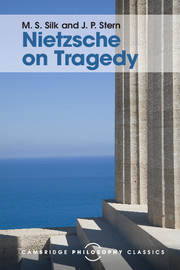Book contents
- Frontmatter
- Dedication
- Epigraph
- Contents
- Preface to this edition
- Preface
- Note
- 1 Germany and Greece
- 2 Biographical background I: Nietzsche and his early interests
- 3 Biographical background II: the genesis of The Birth of Tragedy
- 4 The argument of The Birth of Tragedy
- 5 The aftermath
- 6 Nietzsche's account of Greece
- 7 Mode and originality
- 8 Tragedy, music and aesthetics
- 9 Nietzsche and earlier German theories of tragedy
- 10 Style and philosophy
- Bibliography
- Index
10 - Style and philosophy
Published online by Cambridge University Press: 05 August 2016
- Frontmatter
- Dedication
- Epigraph
- Contents
- Preface to this edition
- Preface
- Note
- 1 Germany and Greece
- 2 Biographical background I: Nietzsche and his early interests
- 3 Biographical background II: the genesis of The Birth of Tragedy
- 4 The argument of The Birth of Tragedy
- 5 The aftermath
- 6 Nietzsche's account of Greece
- 7 Mode and originality
- 8 Tragedy, music and aesthetics
- 9 Nietzsche and earlier German theories of tragedy
- 10 Style and philosophy
- Bibliography
- Index
Summary
§1
The opening paragraph of Nietzsche's book is rich in substance yet succinct; self-confident yet provocative. So characteristic is it of his style and form of argument, and so full of anticipations, that we may use it as a pattern for the book as a whole:
Wir werden viel für die ästhetische Wissenschaft gewonnen haben, wenn wir nicht nur zur logischen Einsicht, sondern zur unmittelbaren Sicherheit der Anschauung gekommen sind, dass die Fortentwickelung der Kunst an die Duplizität des Apollinischen und des Dionysischen gebunden ist: in ähnlicher Weise, wie die Generation von der Zweiheit der Geschlechter, bei fortwährendem Kampfe und nur periodisch eintretender Versöhnung, abhängt. Diese Namen entlehnen wir von den Griechen, welche die tiefsinnigen Geheimlehren ihrer Kunstanschauung zwar nicht in Begriffen, aber in den eindringlich deutlichen Gestalten ihrer Götterwelt dem Einsichtigen vernehmbar machen. An ihre beiden Kunstgottheiten, Apollo und Dionysus, knüpft sich unsere Erkenntnis, dass in der griechischen Welt ein ungeheurer Gegensatz, nach Ursprung und Zielen, zwischen der Kunst des Bildners, der apollinischen, und der unbildlichen Kunst der Musik, als der des Dionysus, besteht: beide so verschiedne Triebe gehen nebeneinander her, zumeist im offnen Zwiespalt miteinander und sich gegenseitig zu immer neuen kräftigeren Geburten reizend, um in ihnen den Kampf jenes Gegensatzes zu perpetuieren, den das gemeinsame Wort ‘Kunst’ nur scheinbar überbrückt; bis sie endlich, durch einen metaphysischen Wunderakt des hellenischen ‘Willens’, miteinander gepaart erscheinen und in dieser Paarung zuletzt das ebenso dionysische als apollinische Kunstwerk der attischen Tragödie erzeugen.
We shall have greatly advanced the science of aesthetics once we have established not only through the perspective of logic but also by intuitive certainty that continuity in the development of art is bound up with the duality of the Apolline and the Dionysiac in a similar way as procreation depends on the duality of the sexes, involving them in perpetual strife and only intermittent reconciliation. These names we borrow from the Greeks, who intimate the profound mysteries of their vision of art to the discerning mind not through concepts but through the arrestingly clear figures of their gods.
- Type
- Chapter
- Information
- Nietzsche on Tragedy , pp. 396 - 452Publisher: Cambridge University PressPrint publication year: 2016

